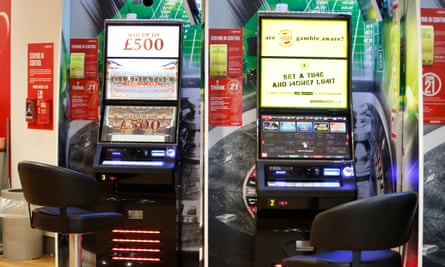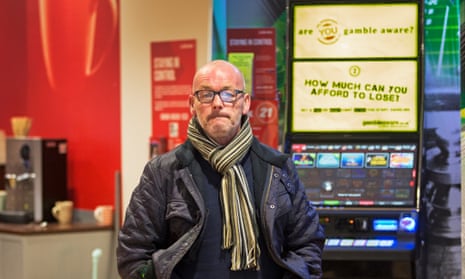Martin Paterson knows just how dangerous compulsive gambling can be. As a former FOBT addict he “ended up going crazy” using the machines. He has been following a government consultation which began in October last year and has been campaigning tirelessly ahead of Tuesday’s results.
“I started off as a normal punter in 2001,” he said. “Before I knew it there were four machines in a shop and I’m being offered free spins. That’s when the pace of gambling changed and sped up to around 100 mph. It was entrapment.”
A review of fixed-odds betting terminals, described as the “crack cocaine of gambling”, could see the maximum bet reduced to between £2 and £50, with many finding the machines addictive because bets of up to £100 can be played every 20 seconds. The Department for Digital, Culture, Media and Sport, reportedly in favour of the most severe restriction - a cut to £2, said it believes current regulation is “inappropriate” and that changes to the maximum stake would help reduce “the potentially harmful impact on the player and their wider communities”.
The proposals include encouraging the industry to take greater social responsibility. Betting shops are able to have four FOBTs in each outlet but there is concern the machines are clustered in poorer areas where there is more unemployment. Though the government has admitted being unaware of how many problem gamblers are receiving treatment on the NHS, the Gambling Commission warns that more than 2 million people in the UK are either problem gamblers or at risk of addiction.
Ahead of the end of the consultation, we wanted to give those most affected by gambling and FOBTs their say and asked readers to share their experiences and thoughts. Among the submissions we received, we heard from gamblers, betting shop employees, family members and those campaigning for change.
The campaigner
For Martin Paterson it isn’t the money he wishes he could get back, but the time spent away from his family. “Yeah I lost money but it’s the time and trust I lost from loved ones that hurts the most,” he said.
With a population of just over 40,000, there are three betting shops along the pedestrianised high street of Coatbridge and 19 within a mile radius of the town centre. In 2016 it was ranked as one of the most deprived areas in Scotland according to the Scottish Index of Multiple Deprivation. “I want to highlight that I think FOBTs and betting shops are mainly a class issue,” he said. “There’s a clustering in deprived communities where you’ll see a pawnshop next to the bookies. I’ve gone in there myself to pawn stuff before going into the bookies.”
For 13 years, when working as a cab driver, he would make around £80 a day losing £50 of it daily on FOBTs.

“There are horrendous feelings of guilt that come with an addiction like this. It’s silent but at its worst it takes lives. I was suicidal and I remember praying to God – if there was a God – because I couldn’t take it any more: the scamming to get money. You would hear people losing hundreds of thousands. Yeah I was only losing £80 but it was critical to my family and I still decided to spend it.”
Now working as a part-time gardener, Paterson campaigns to highlight the addictive nature of FOBTs by calling for lower FOBT stakes and a ban on TV ads before the watershed. “Children are being groomed to gamble,” said Paterson. “Sixteen-year-olds come across ads all the time and are allowed to play the lottery and other low-stakes prize gambling. There’s also amusement arcades to think about where there is no minimum legal age.”
Paterson is cynical about the results of the consultation: “I think it’s all just bullshit. They’ll say the maximum stake should be something like £20 but making it £2 is crucial. Anything more would be catastrophic. It’s still a drip feed but it’s the best on offer. You used to wait 15-20 mins for a proper dog or horse race but bookies are a craic now. The machines just steamroll people like they’re nothing.”
The betting shop employee
Liam recalls one occasion when he watched a customer stake over £16,000 in a day, chasing his losses, only to leave with £1.50. “As a member of staff we were allowed to ‘advise’ customers that they may wish to stop and offer them GamCare leaflets,” he said. “However, at no time were we allowed to cut them off in the same fashion bar staff might do to a drinker who has had too much.”
Working for a few years as a deputy manager at a major high street betting shop, Liam estimates about 60%-70% of the shop’s profits came from FOBTs: “We would make at least £4,000-5,000 on a Saturday, with around half of that from FOBTs. One bank holiday weekend we took in excess of £20,000 just from the machines.
“Profit was very much the end game. If a customer asked us to be cut off we could do that but otherwise there was very limited support we could give people. It created difficult situations for us when we would see someone who is well-known in the area put thousands of pounds into the machines and not be able to physically intervene. I don’t think my employer cared much about having a duty of care to customers. They want people to keep gambling but it often felt cold and heartless working there and getting caught up in all of that.”
Liam thinks betting shops should be able to intervene in the same way that a bar does when someone is too drunk. “We should be thinking not just about the safety of the individual, but also of those around them,” he said. “It’s not just the financial loss that should be a concern but we need to look at the human cost.”
He doesn’t believe anything will come from the consultation though: “The culture won’t really change as it’s a very profit-driven industry. Spending limits on a machine are a start but it will just mean that customers will take marginally longer to stake the same amount. It feels like lip service to a much bigger problem. But how do you deal with a problem when the industry itself doesn’t see it as one?”

The family members
Louise’s dad Nick is a big fan of using FOBTs: “He used to only go to the bookies to put bets on football and horse racing, occasionally staying in the shop to watch some of the races. Now he spends more time in there playing on FOBTs.”
From Manchester but living in London, Louise, 26, said her dad’s been gambling for as long as he’s been working as a skilled labourer. “When he first started around 40 years ago he would go to the pub for a pint at lunch then go to the bookies next door to bet on the horse racing,” she said. “He likes to play at casinos but he couldn’t do that often, so when they introduced FOBTs in the shop I definitely noticed the change in the amount of time he spent there.
Nick realised his gambling was getting out of hand and decided to self-exclude from the shop he often visited. This is when a customer voluntarily asks a bookmaker or gambling provider to bar them from being served, usually for a period between six and 12 months. However, as Louise and her dad soon realised, self-exclusion does little to reduce the temptation to gamble. “He gave them his contact details and within a week he was receiving texts about promotional offers,” she said.
However, Louise feels her family is quite fortunate as her mum, Sally, works as a cashier for a high street betting shop. “When my dad comes into my mum’s shop she’s able to keep an eye on him. She holds the purse strings so he doesn’t have a card he can access easily but is given an allowance instead,” she said.
“She often comes home with heartbreaking stories of people who have lost thousands playing FOBTs. One story in particular was when a woman saw her fiance coming out of the bookie. She dragged him back in and demanded to know why he had been served when he had told her he self-excluded after pawning her engagement ring. It turned out he hadn’t. I think my mum struggles most with how powerless staff are.”
Louise and Sally think limiting the amount people can spend on cards and reducing the number of shops on the high street would make a difference. “My mum often gets people asking her how much they’ve spent on their card in a day. Unlike cash it can be difficult keeping track of money coming out of an online account. There also doesn’t seem to be a limit on how many shops there can be on one street. I don’t see Mayfair overflowing with them.”
The gambler
Ray has gambling debts worth thousands of pounds. When he read about proposals to crack down on FOBTs he said he almost cried with joy.
Now retired, Ray started gambling in his 30s when he played roulette at casinos across the country, spending around £2,000 to £3,000 a night. Before he knew it he had lost his business and his house. At this point Ray discovered FOBTs. Not only were they closer to home but they also offered a variety of different games with promising odds.
“With the big payouts available with high-spin limits it was often possible to win four-figure sums. Although, inevitably, the money went back into the machines sooner or later,” he said. “It created a rollercoaster lifestyle alternating between having pockets full of cash followed by wondering where you would get the money for petrol to get yourself home.
“The machines control your life. Sequences of numbers would come up which regular players would learn and you would quickly build up large sums. But instead of cashing in and walking out you would convince yourself you knew what the next number would be but, of course, it seldom came. More numbers would appear sufficiently tantalising and force you to continue until you ran out of stake money.”
In 2013, Ray struggled with suicidal thoughts on several occasions before “taking the bull by the horns” and admitting to himself that he needed help. After approaching his bank to explain his situation, Ray has received help with paying his debts. “I still find myself gambling occasionally but nowhere near as much as I used to. I spend a lot of time on the internet and doing evil sudokus which helps keep my brain active, and now I can see light at the end of the tunnel.”
Speaking about the consultation, Ray feels low stakes and more restrictions would help discourage people. “The bookies won’t be happy with a maximum bid of £10, as lower stakes mean fewer punters and they’ll be forced to reduce the number of machines they have. It’s too late to save my life but there are more and more younger players and they definitely need protecting.”
Some names have been changed.
If you think you have a problem with gambling you can contact GambleAware in the UK on 0808 8020 133. In the US the National Council on Problem Gambling helpline is 1-800-522-4700. In Australia, the Gambling Helpline is 1800 858 858. Other international gambling helplines can be found at www.ncpgambling.org.
In the UK the Samaritans can be contacted on 116 123. In the US, the National Suicide Prevention Lifeline is 1-800-273-8255. In Australia, the crisis support service Lifeline is on 13 11 14. Other international suicide helplines can be found at www.befrienders.org.

Comments (…)
Sign in or create your Guardian account to join the discussion